- Home
- Tahereh Mafi
This Woven Kingdom Page 2
This Woven Kingdom Read online
Page 2
Clad only in her shift, she yawned, yawned as she sat on her cot, as the mattress sank, as she pulled the pins from her hair. The day—and her long, heavy curls—crashed down around her shoulders.
Her thoughts had begun to slur.
With great reluctance she blew out the candle, pulled her legs against her chest, and fell over like a poorly weighted insect. The illogic of her phobia was consistent only in perplexing her, for when she was abed and her eyes closed, Alizeh imagined she could more easily conquer the dark, and even as she trembled with a familiar chill, she succumbed quickly to sleep. She reached for her soft quilt and drew it up over her shoulders, trying not to think about how cold she was, trying not to think at all. In fact she shivered so violently she hardly noticed when he sat down, his weight depressing the mattress at the foot of her bed.
Alizeh bit back a scream.
Her eyes flew open, tired pupils fighting to widen their aperture. Frantically, Alizeh patted down her quilt, her pillow, her threadbare mattress. There was no body on her bed. No one in her room.
Had she been hallucinating? She fumbled for her candle and dropped it, her hands shaking.
Surely, she’d been dreaming.
The mattress groaned—the weight shifting—and Alizeh experienced a fear so violent she saw sparks. She pushed backward, knocking her head against the wall, and somehow the pain focused her panic.
A sharp snap and a flame caught between his barely there fingers, illuminated the contours of his face.
Alizeh dared not breathe.
Even in silhouette she couldn’t see him, not properly, but then—it was not his face, but his voice, that had made the devil notorious.
Alizeh knew this better than most.
Seldom did the devil present himself in some approximation of flesh; rare were his clear and memorable communications. Indeed, the creature was not as powerful as his legacy insisted, for he’d been denied the right to speak as another might, doomed forever to hold forth in riddles, and allowed permission only to persuade a person to ruin, never to command.
It was not usual, then, for one to claim an acquaintance with the devil, nor was it with any conviction that a person might speak of his methods, for the presence of such evil was experienced most often only through a provoking of sensation.
Alizeh did not like to be the exception.
Indeed it was with some pain that she acknowledged the circumstances of her birth: that it had been the devil to first offer congratulations at her cradle, his unwelcome ciphers as inescapable as the wet of rain. Alizeh’s parents had tried, desperately, to banish such a beast from their home, but he had returned again and again, forever embroidering the tapestry of her life with ominous forebodings, in what seemed a promise of destruction she could not outmaneuver.
Even now she felt the devil’s voice, felt it like a breath loosed inside her body, an exhale against her bones.
There once was a man, he whispered.
“No,” she nearly shouted, panicking. “Not another riddle—please—”
There once was a man, he whispered, who bore a snake on each shoulder.
Alizeh clapped both hands over her ears and shook her head; she’d never wanted so badly to cry.
“Please,” she said, “please don’t—”
Again:
There once was a man
who bore a snake on each shoulder.
If the snakes were well fed
their master ceased growing older.
Alizeh squeezed her eyes shut, pulled her knees to her chest. He wouldn’t stop. She couldn’t shut him out.
What they ate no one knew, even as the children—
“Please,” she said, begging now. “Please, I don’t want to know—”
What they ate no one knew,
even as the children were found
with brains shucked from their skulls,
bodies splayed on the ground.
She inhaled sharply and he was gone, gone, the devil’s voice torn free from her bones. The room suddenly shuddered around her, shadows lifting and stretching—and in the warped light a strange, hazy face peered back at her. Alizeh bit her lip so hard she tasted blood.
It was a young man staring at her now, one she did not recognize.
That he was human, Alizeh had no doubt—but something about him seemed different from the others. In the dim light the young man seemed carved not from clay, but marble, his face trapped in hard lines, centered by a soft mouth. The longer she stared at him the harder her heart raced. Was this the man with the snakes? Why did it even matter? Why would she ever believe a single word spoken by the devil?
Ah, but she already knew the answer to the latter.
Alizeh was losing her calm. Her mind screamed at her to look away from the conjured face, screamed that this was all madness—and yet.
Heat crept up her neck.
Alizeh was unaccustomed to staring too long at any face, and this one was violently handsome. He had noble features, all straight lines and hollows, easy arrogance at rest. He tilted his head as he took her in, unflinching as he studied her eyes. All his unwavering attention stoked a forgotten flame inside her, startling her tired mind.
And then, a hand.
His hand, conjured from a curl of darkness. He was looking straight into her eyes when he dragged a vanishing finger across her lips.
She screamed.
In the Beginning
THE STORY OF THE DEVIL had worn thin in the retelling, but Iblees, Iblees, his true name like a heartbeat on the tongue, was lost to the catacombs of history. His own people knew best that the beast was wrought not from light, but fire. Not angel, but Jinn, an ancient race who’d once owned the earth, who’d once celebrated this young man’s extraordinary elevation to the heavens. They knew best whence he came, because they were there when he was returned, when his body cracked against the earth and their world was left to rot in the wake of his arrogance.
Birds froze when his body fell out of the sky, their sharp beaks parted, broad wings pinned open in midair. He glistened in his descent, flesh slick with fresh melt, heavy drops of liquid fire rolling off his skin. His drippings, still steaming, would hit the earth before his heft would, disintegrating frogs and trees and the shared dignity of an entire civilization who would be forced forever to scream his name at the stars.
For when Iblees fell, so too did his people.
It was not God, but the occupants of the expanding universe that would soon forsake the Jinn; every celestial body had borne witness to the genesis of the devil, to a creature of darkness heretofore unknown, unnamed—and none wished to be seen as sympathetic to an enemy of the All-Powerful.
The sun was the first to turn its back on them. A single wink and it was done; their planet, Earth, was plunged into perpetual night, armored in ice, flung out of orbit. The moon faded next, knocking the world off its axis, warping its oceans. All was soon flooded, then frozen; the population neatly halved in three days. Thousands of years of history, of art and literature and invention: obliterated.
Still, the surviving Jinn dared to hope.
It was when the stars finally devoured themselves, one by one; when land sank and fissured underfoot; when maps of centuries past were suddenly rendered obsolete. It was when they could no longer find their way in the perpetual dark that the Jinn felt truly, irrevocably, lost.
They soon scattered.
Iblees had been charged for his crime with a single task: to haunt forever the dirt forms that would soon crawl out of the earth. Clay—that crude, rudimentary form before which Iblees would not kneel—would inherit the world the Jinn had once owned. Of this, the Jinn were certain. It had been foretold.
When? They did not know.
The heavens observed the devil, the half-life he was forced to live. All watched silently as frozen seas overwhelmed the shores, tides rising parallel to his wrath. With every passing moment the darkness grew thicker, denser with the stench of death.
Without
the skies to guide them, the remaining Jinn could not determine how long their people spent compressed under cold and darkness. It felt like centuries but might’ve been days. What was time when there were no moons to mind the hour, no suns to define a year? Time was told only through birth, through the children who lived. That their souls were forged from fire was the first of two reasons any Jinn had survived the infinite winters, the second: that they required only water for nourishment.
Clay shaped itself slowly in such waters, shuddering into a finished form while another civilization died, en masse, of heartbreak, of horror. The Jinn who endured against all odds were plagued always by a rage trapped in their chests, a rage held at bay only by the weight of an unyielding shame.
Jinn were once the sole intelligent beings on Earth; they were creatures built stronger, faster, simpler, and more cunning than Clay would ever be. Still, most had gone blind in the perpetual blackness. Their skin grew ashen, their irises white, stripped of pigment in the dark. In the torturous absence of the sun, even these fiery beings had grown weak, and when Clay, freshly formed, finally stood tall on steady legs, the sun flared back to life—swinging their planet back into focus, and bringing with it a searing pain.
Heat.
It desiccated the Jinns’ unaccustomed eyes, melted the remaining flesh from their bones. For the Jinn who’d sought shelter from this heat, there was hope: with the return of the sun came the moon, and with the moon, the stars. By starlight they navigated their way to safety, taking refuge at the apex of the earth, in a blistering cold that had begun to feel like home. Quietly, they built a modest new kingdom, all the while pressing their supernatural bodies so hard against the planes of space and time as to practically disappear.
It did not matter that Jinn were stronger than the Clay bodies—human beings, they called themselves—that now owned the earth and its skies. It did not matter that Jinn possessed more power and strength and speed. It did not matter how hot their souls burned. Dirt, they had learned, would smother a flame. Dirt would eventually bury them all.
And Iblees—
Iblees was never far.
The devil’s everlasting, shameful existence was a powerful reminder of all they’d lost, of all they’d endured to survive. With profound regret, Jinn surrendered the earth to its new kings—and prayed never to be found.
It was yet another prayer that went unanswered.
Three
ALIZEH SHOVED INTO THE EARLY morning light.
She’d shoved out of bed, shoved on her clothes, shoved pins in her hair, shoved shoes on her feet. She usually took greater care with her toilette, but she’d slept later than she’d intended and had no time to do more than run a damp cloth over her eyes. The finished commission was due for delivery today, and she’d wrapped the glittering gown in layers of tulle, securing the package with twine. Alizeh handled the large parcel carefully as she tiptoed downstairs and, after building the fire in the kitchen hearth, pushed open the heavy wooden door—only to be met with fresh snowfall up to her knees.
Alizeh’s body nearly sagged with disappointment. She squeezed her eyes shut, took a steadying breath.
No.
She would not return to bed. It was true she did not yet own a proper winter coat. Or hat. Or even gloves. It was also true that if she raced back up the stairs this very instant she might manage to sleep a full hour before she was needed.
But no.
She forced her spine straight, clutched the precious bundle to her chest. Today, she would be getting paid.
Alizeh stepped into the snow.
The moon was so large this morning it blotted out most of the sky, its reflected light suffusing all in a dreamy glow. The sun was but a pinprick in the distance, its outline shining through a soufflé of clouds. Trees stood tall and white, branches heavy with powder. It was early yet—snow still untouched along the paths—and the world shimmered, so white it looked almost blue. Blue snow, blue sky, blue moon. The air seemed even to smell blue, it was so cold.
Alizeh huddled deeper into her thin jacket, listening as the wind tore through the streets. Plowmen appeared as suddenly as if they’d been conjured by her thoughts, and she watched their choreographed movements, red trapper hats bobbing to and fro as shovels scraped to reveal stripes of gold cobblestone. Alizeh hurried herself onto a quickly clearing path and shook the snow from her clothes, stamped her feet against the glimmering stone. She was wet up to her thighs and did not want to think on it.
Instead, she looked up.
The day was not yet born, its sounds not yet formed. Street vendors had yet to set up their kiosks, shops had yet to unlatch their shuttered windows. Today, a trio of bright-green ducks waddled down the powdered median as wary shopkeepers peered out of doorways, poking broomsticks into the snow. A colossal white bear lounged on an icy corner, a street child sleeping soundly against its fur. Alizeh gave the bear a wide berth as she rounded the corner, her eyes following a spiral of smoke into the sky. Outdoor food carts were lighting their fires, preparing their wares. Alizeh inhaled the unfamiliar scents, testing them against her mind. She’d studied cookery—could identify eatables by sight—but she’d not had enough experience with food to be able to name things by smell.
Jinn enjoyed food, but they did not need it, not the way most creatures did; as a result, Alizeh had forgone the decadence for several years. She used her income to pay instead for sewing supplies and regular baths at the local hamams. Her need for cleanliness grew parallel to her need for water. Fire was her soul, but water was her life; it was all she needed to survive. She drank it, bathed in it, required often to be near it. Cleanliness had, as a result, become a foundational principle of her life, one that had been hammered into her from childhood. Every few months she trekked deep into the forest to find a miswak tree—a toothbrush tree—from which she harvested the brush she used to keep her mouth fresh and her teeth white. Her line of work often left her filthy, and any truly idle time she had, she spent polishing herself to a shine. It was in fact her preoccupation with cleanliness that had led her to consider the benefits of such a profession.
Alizeh stopped.
She’d happened upon a shaft of sunlight and stood in it now, warming in the rays as a memory bloomed in her mind.
A soapy bucket.
The coarse bristles of a floor brush.
Her parents, laughing.
The memory felt not unlike a handprint of heat against her sternum. Alizeh’s mother and father had thought it critical to teach their child not only to care and clean for her own home, but to have basic knowledge of most all technical and mechanical labor; they’d wanted her to know the weight of a day’s work. But then, they’d only meant to teach her a valuable lesson—they’d never meant for her to earn her living this way.
While Alizeh had spent her younger years being honed by masters and tutors, so, too, had her parents humbled her in preparation for her imagined future, insisting always upon the greater good, the essential quality of compassion.
Feel, her parents had once said to her.
The shackles worn by your people are often unseen by the eye. Feel, they’d said, for even blind, you will know how to break them.
Would her mother and father laugh if they saw her now? Would they cry?
Alizeh didn’t mind working in service—she’d never minded hard work—but she knew she was likely a disappointment to her parents, even if only to their memories.
Her smile faltered.
The boy was fast—and Alizeh had been distracted—so it took her a second longer than usual to notice him. Which meant she hadn’t noticed him at all until the knife was at her throat.
“Le man et parcel,” he said, his breath hot and sour against her face. He spoke Feshtoon, which meant he was far from home, and probably hungry. He towered over her from behind, his free hand roughly gripping her waist. By all appearances she was being assaulted by a barbarian—and yet, somehow, she knew he was just a boy, one overgrown for his age.
>
Gently, she said: “Unhand me. Do it now and I give you my word I will leave you unharmed.”
He laughed. “Nez beshoff.” Stupid woman.
Alizeh tucked the parcel under her left arm and snapped his wrist with her right hand, feeling the blade graze her throat as he screamed, stumbling back. She caught him before he fell, caught his arm and twisted it, dislocating his shoulder before pushing him into the snow. She stood over him as he sobbed, half-buried in the drift. Passersby were averting their eyes, uninvested as she knew they would be in the lower rungs of the world. A servant and a street urchin could be counted upon to do away with each other, save the magistrates the extra work.
It was a grim thought.
Carefully, Alizeh retrieved the boy’s blade from the snow, examined its crude workmanship. She appraised the boy, too. His face was nearly as young as she’d suspected. Twelve? Thirteen?
She knelt beside him and he stiffened, his sobs briefly ceasing in his chest. “Nek, nek, lotfi, lotfi—” No, no, please, please—
She took his unbroken hand in her own, uncurled the dirty fingers, pressed the hilt back into his palm. She knew the poor boy would need it.
Still.
“There are other ways to stay alive,” she whispered in Feshtoon. “Come to the kitchens at Baz House if you are in need of bread.”
The boy stared at her then, turned the full force of his terrified gaze upon her. She could see him searching for her eyes through her snoda. “Shora?” he said. Why?
Alizeh almost smiled.
“Bek mefem,” she said quietly. Because I understand. “Bek bidem.” Because I’ve been you.
Alizeh did not wait for him to respond before she pushed herself to her feet, shook out her skirts. She felt a bit of moisture at her throat and retrieved a handkerchief from her pocket, which she pressed to the wound. She was still standing, unmoving, when the bell tolled, signaling the hour and startling into flight a constellation of starlings, their iridescent plumage glittering in the light.

 Shatter Me
Shatter Me Restore Me
Restore Me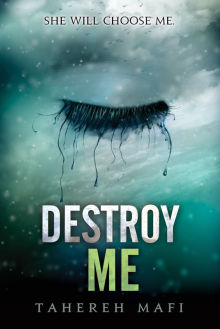 Destroy Me
Destroy Me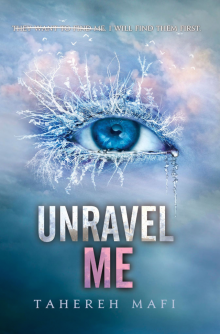 Unravel Me
Unravel Me Ignite Me
Ignite Me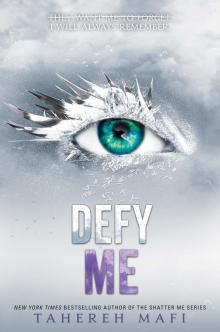 Defy Me
Defy Me Fracture Me
Fracture Me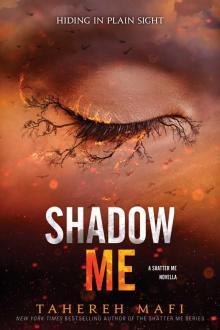 Shadow Me
Shadow Me Whichwood
Whichwood Reveal Me
Reveal Me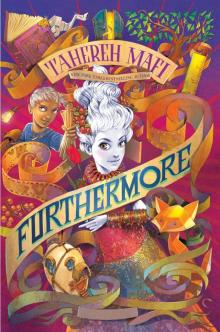 Furthermore
Furthermore Shadow Me (Shatter Me Novella)
Shadow Me (Shatter Me Novella) Believe Me
Believe Me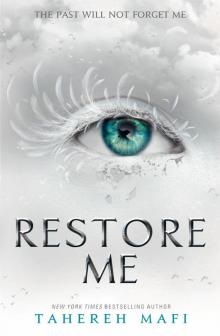 Restore Me (Shatter Me)
Restore Me (Shatter Me)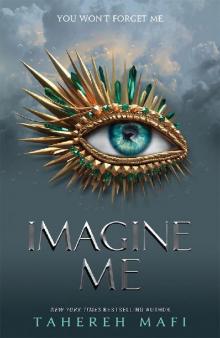 Imagine Me
Imagine Me An Emotion of Great Delight
An Emotion of Great Delight Find Me
Find Me A Very Large Expanse of Sea
A Very Large Expanse of Sea Unravel Me: The Juliette Chronicles Book 2
Unravel Me: The Juliette Chronicles Book 2